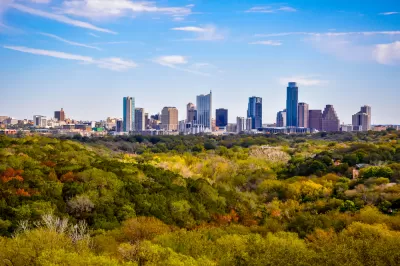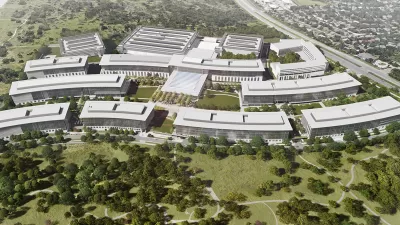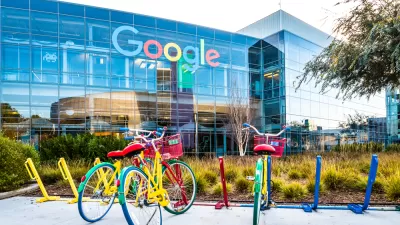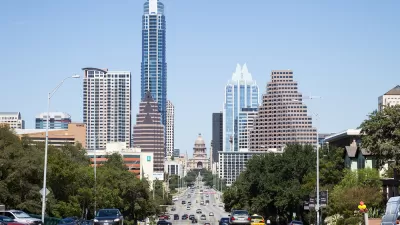Apple has plans to build a new campus and expand its Texas workforce. The decision to expand to an Austin suburb points to both regional and national trends and outcomes.

Sarah Holder takes a closer look at Apple’s plan to expand in Austin, Texas. The company has announced that it will add 5,000 new employees and a 133-acre campus in North Austin, less than a mile from its existing facilities.
The decision reflects a pattern seen with other tech companies expanding operations in places where significant numbers of employees are located. "That means Apple is the latest example of like flocking with like—tech companies choosing to settle in places they’ve already identified as talent centers," says Holder.
Apple’s new facility in Austin is also far from the city center, and part of the trend of the suburban tech campus. These campuses often operate as self-contained worlds with little public transportation access, and this can exacerbate inequality in a region, notes Holder:
The geography of jobs varies by city, [Yonah Freemark] says, but it often follows a predictable path: When campuses and corporations are placed on highways, wealthier people with access to cars also have easier access to employment, whereas other low-income or non-white people are more reliant on transit, and therefore shut out of the game in cities without comprehensive connections.
Holder points out that Apple is getting tax incentives and rebates from the county and state, though not as massive as what Amazon will be receiving for its new headquarters, and it could become the largest private employer in Texas. Its expansion in Austin and tech industry growth in other target areas — such as New York and Washington, D.C. — also reflect the growing gap between winner and loser cities.
FULL STORY: Why Apple Bet on Austin’s Suburbs for Its Next Big Expansion

Alabama: Trump Terminates Settlements for Black Communities Harmed By Raw Sewage
Trump deemed the landmark civil rights agreement “illegal DEI and environmental justice policy.”

Study: Maui’s Plan to Convert Vacation Rentals to Long-Term Housing Could Cause Nearly $1 Billion Economic Loss
The plan would reduce visitor accommodation by 25% resulting in 1,900 jobs lost.

Planetizen Federal Action Tracker
A weekly monitor of how Trump’s orders and actions are impacting planners and planning in America.

Waymo Gets Permission to Map SF’s Market Street
If allowed to operate on the traffic-restricted street, Waymo’s autonomous taxis would have a leg up over ride-hailing competitors — and counter the city’s efforts to grow bike and pedestrian on the thoroughfare.

Parklet Symposium Highlights the Success of Shared Spaces
Parklets got a boost during the Covid-19 pandemic, when the concept was translated to outdoor dining programs that offered restaurants a lifeline during the shutdown.

Federal Homelessness Agency Places Entire Staff on Leave
The U.S. Interagency Council on Homelessness is the only federal agency dedicated to preventing and ending homelessness.
Urban Design for Planners 1: Software Tools
This six-course series explores essential urban design concepts using open source software and equips planners with the tools they need to participate fully in the urban design process.
Planning for Universal Design
Learn the tools for implementing Universal Design in planning regulations.
Caltrans
Smith Gee Studio
Institute for Housing and Urban Development Studies (IHS)
City of Grandview
Harvard GSD Executive Education
Toledo-Lucas County Plan Commissions
Salt Lake City
NYU Wagner Graduate School of Public Service





























